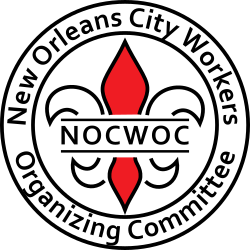The Fight to Defend Public Sector Union Rights
What can take you years of organizing and struggle to win can be smashed in the span of weeks. Or, at least, it appears that Republicans will make this happen if Louisiana’s labor movement doesn’t put boots on the ground right away.
Such is the case with Louisiana public workers’ rights to unionize. In June 2023, after four years of painstaking worker-to-worker organizing initiated by NOCWOC (New Orleans City Workers Organizing Committee), city employeeswon the right to collective bargaining and the ability to organize their workplace. Just over 9 months later, however, the newly ensconced Republican super-majority in the state legislature has decided they must abolish those rights.
There are currently 27 bills filed in both the Louisiana House and Senate aimed at curtailing public sector unionization, weakening workers’ compensation, stripping workers of workplace protections, and decimating unemployment benefits. In particular, House Bills 523, 571 and 572 aim to restrict public sector organizing in various ways, from banning it outright to placing onerous thresholds for recertification on unions. SB 264 and 331 seek to prohibit voluntary dues deductions from paychecks, the primary way workers contribute to their union as members. Again, the primary aim with all of these bills is to reduce the power of working class Louisianians, stop the wave of unionization in the public sector, and render the Louisiana Democratic Party (as ineffectual as it has been in this state) completely toothless in future elections. Further down the line, but not very far off, is the dismantling of the state’s civil service system, mass layoffs of public workers, and the privatization or closure of local and state government services. Essentially, Republicans are doing to the entire state of Louisiana what they and their neoliberal allies did to New Orleans after Hurricane Katrina, reducing the social services and redistributive programs that had been built up for decades in one of the US’s most underdeveloped states.
These bills should be seen as direct attacks on the women and Black Louisianians who make up a significant section of public employees and union members. Clearly, the state legislature’s majority is taking aim at the entire working class of Louisiana in order to halt the advance of the labor movement that has caught fire throughout the country and made important advances in our state. From teachers, to librarians, to custodial workers, to lifeguards, to engineers, to groundskeepers, to bus drivers, to office staff, to housing inspectors, and every job done by state, parish, and city employees – these are the workers Republicans are seeking to harm all of them by stripping their rights to union power.
It’s no surprise though that this attack is happening at this moment. In New Orleans alone, recent victories by the resurgent labor movement (and widespread union support in public opinion) have led to important victories by Starbucks Workers United and National Nurses United. United Teachers of New Orleans have made critical gains in organizing the Orleans Parish charter school system, and in June 2023, New Orleans City Workers Organizing Committee successfully passed the Right to Organize Ordinance, which codifies city employees organizing rights.
It is this ordinance that one sees the potential future of public sector organizing in the state, and the target Republicans have marked for eradication. The Right to Organize Ordinance establishes a potent example of labor recognition for public entities across the state and amplifies the voice of organized workers in both the public and private sector. Modeled on legislation in Virginia, the ordinance establishes card-check union recognition, permits organizing and union representation, and requires the city government to actually enter into contract negotiations with unions that acquire card-check certification. By passing the ordinance, the City Council signified their willingness to cooperate with labor rather than oppose worker organizing.
Public sector workers, when they are organized, wield tremendous power, so it’s no secret that the corporate sector, major donors to both parties, and many mayors want to limit public employee union rights. That’s because public workers are a major line of defense in the fight to preserve public institutions. Unionized workers have concentrated power at the ballot box, able to elect officials who will preserve public funding for union jobs and public services like libraries, schools, housing, health services, and public parks. To illustrate: since 2020, public sector workers in New Orleans have repeatedly won gains for themselves and for the city’s entire working class. NOCWOC and Step Up’s fight for a $15/hr minimum wage in 2021 for city employees also extends to all city contracted workers; the fight to save public library funding in 2020 made sure that all 15 branches of NOPL remained open and that its resources and literacy services remained funded and accessible.
Our public institutions, weakened as they are after decades of budget cuts, remain critical services for the residents of our cities and rural parishes, from every age and background, without the requirement that people pay directly for these services. That is why they are abhorred by capitalists and eagerly destroyed as soon as the Right gets in power. The functions of government are top priorities for privatization – from the likes of charter school privatizers and segments of the nonprofit sector, to major corporate interests eager to reduce their own tax burdens and government oversight.
This is the key point: the fight for public workers’ unionization rights is the fight to save and expand our public institutions. And in order for the labor movement to win the fight against the forces of corporate power, of capital, and of the rising wave of fascist politics, it will be based on a conscious program of fighting for a robust and expansive public sector, for public jobs, and for union rights.
